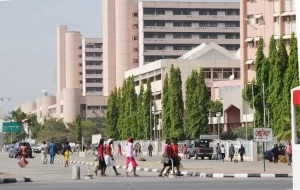Pay Us Our January Salaries – FG Workers Lament

Workers in different federal establishments across the country have bemoaned the delay in the payment of their January salary, describing the action of the government as insensitive considering the current economic situation in the country.
Some of the workers said the delay is the worst in recent years, worse than they experienced during the COVID-19 pandemic when workers were asked to stay at home.
PREMIUM TIMES learnt that a memo from the Office of the Accountant General of the Federation had earlier notified the workers of the delay.
According to the memo, the accountant general’s office was working on finalising the 2024 Appropriation on the GIFMIS platform, and as a result the Personnel Warrant for the month of January 2024 was yet to be released.
The memo, it was learnt, stated that the delay would cut across Ministries, Departments and Agencies (MDAs). It urged the affected members of staff to exercise patience while the issues were being sorted.
In Ekiti State, some of the workers who spoke with PREMIUM TIMES included staff of the Federal University, Oye Ekiti (FUOYE), Federal Polytechnic, Ado Ekiti; Federal Radio Corporation of Nigeria (FRCN); National Orientation Agency (NOA), and Federal Ministry of Information, among others.
An official of FUOYE, Wole Balogun, said that with the hardship being faced by the people, it was inconceivable that salaries could be delayed longer than necessary.
Mr Balogun, who blamed the delay on an unnecessary bureaucratic bottleneck associated with the payment platforms, urged the federal government to expedite action on the payment, “because the situation is becoming unbearable.”
A staffer of the Federal Polytechnic, Ado Ekiti, Folashade Daramola, also lamented the delay. She noted that many members of staff have loan obligations that they ought to have paid as at when due, which have remained pending.
“We are finding it difficult to even go to work; after all, we depend on our salary to be able to transport ourselves, not to talk of feeding our families. We are tired of excuses, let them pay our salary,” Mrs Daramola said.
Also, Owoeye Ilesanmi, who is a staffer of the National Orientation Agency (NOA), said that in addition to delay in the payment of January salary, the federal government has reneged on the payment of the wage award.
“We have only received a wage award of two months, while three months is outstanding. The whole thing boils down to insensitivity on the part of the government. How do we survive without our salary and the wage award? I think the government should show empathy by paying us all the money they owe us,” he said.
The wage award is the allowance that the federal government promised to pay federal workers for six months to assuage the impact of the removal of subsidy on petrol. Following the subsidy removal and other government policies, prices of goods and services have more than doubled despite the non-increase in wages for many workers.
In Ibadan, Oyo State, another federal civil servant, Idris Badiru, while lamenting the delay in payment of January salary, described the situation as pathetic.
“January the 39th! Alagbase ti si oko gba bayi,” he wrote on his Facebook page, using a Yoruba terminology to indicate the lamentation of an unpaid worker.
In Katsina State, many federal workers spoken to also said they had not been paid their salary and palliatives support from the government.
Some of the affected workers told PREMIUM TIMES that the delay was affecting their work schedule, as they now find it difficult to go to work, especially those living in areas far from their offices.
“I work in a department that requires me to go to the office every day, but I’ve finished my savings and I’m finding it difficult to travel to Dutsin Ma to undertake my responsibility,” Faruk (surname withheld), who is an engineer with the department of Physical Planning and Works at the Federal University, Dutsin Ma, said.
“Things are hard, but we have no option than to oblige,” he added.
Mr Bala travels to and from Dutsin Ma from Katsina metropolis, a 68-Kilometre journey, every working day.
“On these travels, I can spend a whole month’s salary not to talk of the foodstuffs and other basic necessities,” he said.
Others told our reporter that the situation was making life difficult for them as prices of foodstuffs keep increasing.
Another non-academic worker of the Federal Polytechnic, Daura, who asked not to be named for fear of victimisation, said the delay in salary payment is affecting her activities, especially because she travels daily from Katsina to Daura.
“The polytechnic is new so there are no houses for staff, most of us travel to the school on a daily basis, which compounds our situation.
“Though, we’ve been notified by the management of the salary delay, I think it’s unfair for the government, especially because January is usually a long month,” the official, who works in the Students’ Affairs department said.
On the palliative support, most of them said they only received the palliative for two months – October and November, 2023.
A staffer of the National Population Commission in Katsina State said he has since stopped going to the office “because several of my colleagues are no longer going too.”
An official of the Nigerian Television Authority (NTA) in Edo State, Jude Abugu, described the delay in payment of salaries as commonplace in recent months. He said there has been frequent delays in payment of salaries of federal civil servants since the new administration came onboard last month.
Mr Abugu said he received his January salary on 2 February.
“I think that was the earliest that they have paid us a salary. There are times when our salaries will come in during the first or second week of the next month,” he said.



